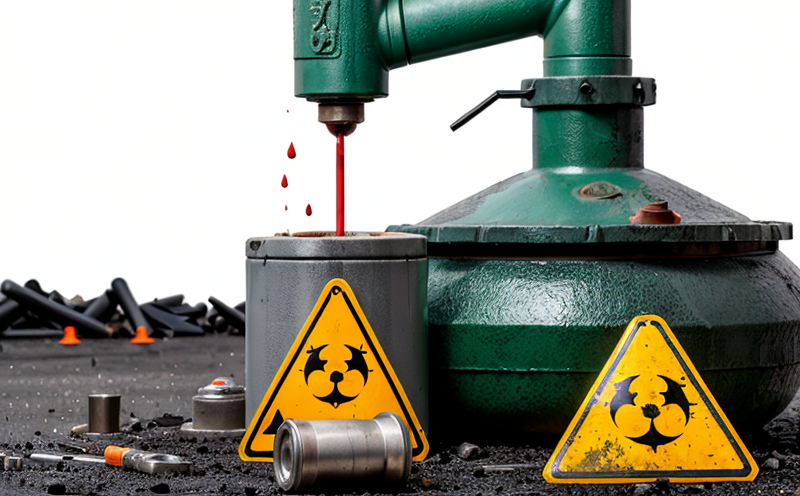Concrete Hazardous Compound Analysis
Concrete is a widely used construction material in various sectors such as infrastructure and building development. However, certain compounds within concrete can be hazardous if not properly identified and managed. Eurolab specializes in the analysis of these potentially harmful substances to ensure that they do not pose risks during use or disposal.
The process begins with a comprehensive sampling protocol where small portions of the concrete are extracted from various points on-site. These samples must represent different layers and types within the structure, ensuring accurate representation for testing. Once collected, these samples undergo rigorous pre-treatment steps including drying to constant weight at 105°C ± 3°C and sieving based on particle size distribution.
Eurolab employs cutting-edge analytical techniques that adhere strictly to international standards such as ISO/IEC 17025 for proficiency. For instance, we use Fourier Transform Infrared Spectroscopy (FTIR) which is highly sensitive in detecting trace amounts of organic compounds like phenol formaldehyde resins used in admixtures. X-ray Diffraction (XRD) helps identify crystalline phases that could indicate the presence of certain salts or minerals.
Another key aspect involves assessing physical properties such as porosity and permeability, which can influence how hazardous compounds behave within the structure over time. This requires specialized equipment like pressure plates for determining water absorption and capillary suction tests. Additionally, leachate studies are conducted to simulate real-world conditions under which concrete might come into contact with water or soil.
The results obtained from these analyses provide detailed information about any hazardous compounds present in the concrete composition. This includes not only identifying what substances are there but also quantifying their levels. The data generated serves multiple purposes including compliance verification against regulatory requirements and informing decisions regarding safety measures during construction processes.
Our dedicated team of chemists reviews all findings meticulously before preparing detailed reports tailored specifically for our clients. These documents serve as valuable resources not only for current projects but also future endeavors where similar materials might be employed.
To summarize, Eurolab's Concrete Hazardous Compound Analysis service ensures that concrete used in various applications remains safe and reliable throughout its lifecycle. By leveraging advanced analytical methods combined with thorough sampling protocols, we provide clients with comprehensive insights into potential risks associated with their projects' components.
Scope and Methodology
The scope of Eurolab's Concrete Hazardous Compound Analysis encompasses a wide range of substances that could be considered harmful or toxic. This includes but is not limited to phenol formaldehyde resins, heavy metals like lead and mercury, arsenic compounds, and various other organic solvents commonly found in admixtures.
In terms of methodology, the approach follows strict procedures outlined by recognized international standards such as ISO/IEC 17025. Upon receipt of concrete samples, they undergo initial screening using FTIR to determine which specific analyses are required based on composition. Next comes detailed examination via XRD to understand crystallographic structures that may contribute to toxicity.
For physical property assessments, pressure plates measure water absorption while capillary suction tests evaluate permeability characteristics. Leachate studies simulate environmental exposure conditions by exposing concrete samples to controlled amounts of water over specified periods before analyzing the resulting liquids for dissolved contaminants.
The entire process emphasizes accuracy and precision, ensuring that every step adheres to best practices established within the industry. This commitment translates into reliable results that can be confidently relied upon when making informed decisions about safety aspects related to concrete usage.
Industry Applications
The analysis of hazardous compounds in concrete finds application across numerous industries where structural integrity and safety are paramount. Construction firms involved in major infrastructure projects like bridges, tunnels, and high-rise buildings rely on this service to ensure compliance with environmental regulations.
In the realm of residential developments, ensuring that no harmful substances leach into groundwater or soil is crucial for protecting public health. Similarly, commercial establishments such as offices and retail spaces benefit from knowing whether their concrete foundations contain toxic elements that could pose long-term risks.
Manufacturers producing precast concrete products also utilize this service to guarantee quality control throughout production processes. By identifying any potentially dangerous compounds early on, they can implement corrective actions immediately rather than facing costly issues later down the line.
Furthermore, government bodies responsible for overseeing public works initiatives depend heavily upon accurate assessments of concrete composition to protect citizens from exposure to hazardous materials. This proactive approach helps maintain trust between authorities and communities served by these projects.
Eurolab Advantages
At Eurolab, we pride ourselves on offering unparalleled expertise in the field of concrete hazardous compound analysis. Our team consists of highly skilled chemists who stay abreast of the latest developments in analytical techniques and methodologies.
We utilize state-of-the-art equipment that meets or exceeds international standards ensuring consistent accuracy across all analyses performed. With our advanced facilities, we can handle large volumes of samples efficiently without compromising on quality.
Our commitment to excellence extends beyond just technical proficiency; it also includes providing exceptional customer service tailored specifically for each client's needs. Whether you need assistance interpreting results or require detailed reports customized according to your requirements, our knowledgeable staff is always available to help.
In addition, Eurolab maintains strict confidentiality protocols ensuring that all sensitive information remains secure throughout the analysis process and beyond. This transparency builds trust between us and our clients fostering long-term partnerships based on mutual respect and reliability.





